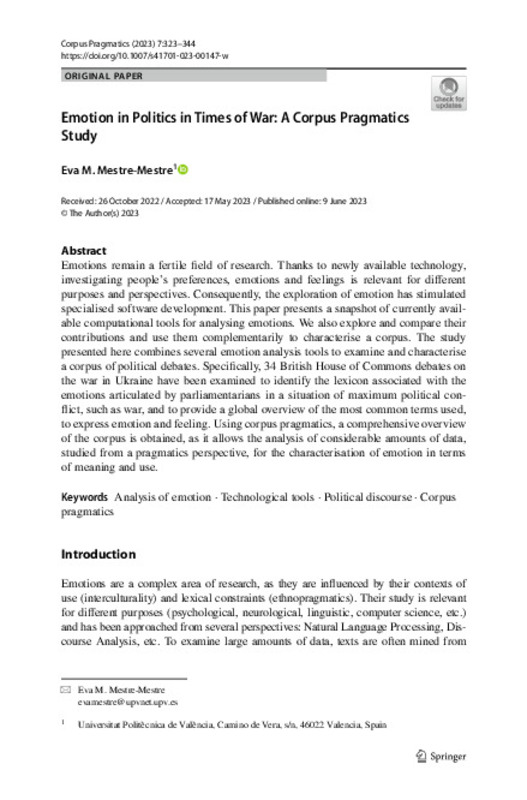JavaScript is disabled for your browser. Some features of this site may not work without it.
Buscar en RiuNet
Listar
Mi cuenta
Estadísticas
Ayuda RiuNet
Admin. UPV
Emotion in Politics in Times of War: A Corpus Pragmatics Study
Mostrar el registro sencillo del ítem
Ficheros en el ítem
| dc.contributor.author | Mestre-Mestre, Eva M.
|
es_ES |
| dc.date.accessioned | 2024-01-11T19:03:00Z | |
| dc.date.available | 2024-01-11T19:03:00Z | |
| dc.date.issued | 2023-12 | es_ES |
| dc.identifier.uri | http://hdl.handle.net/10251/201836 | |
| dc.description.abstract | [EN] Emotions remain a fertile field of research. Thanks to newly available technology, investigating people's preferences, emotions and feelings is relevant for different purposes and perspectives. Consequently, the exploration of emotion has stimulated specialised software development. This paper presents a snapshot of currently available computational tools for analysing emotions. We also explore and compare their contributions and use them complementarily to characterise a corpus. The study presented here combines several emotion analysis tools to examine and characterise a corpus of political debates. Specifically, 34 British House of Commons debates on the war in Ukraine have been examined to identify the lexicon associated with the emotions articulated by parliamentarians in a situation of maximum political conflict, such as war, and to provide a global overview of the most common terms used, to express emotion and feeling. Using corpus pragmatics, a comprehensive overview of the corpus is obtained, as it allows the analysis of considerable amounts of data, studied from a pragmatics perspective, for the characterisation of emotion in terms of meaning and use. | es_ES |
| dc.description.sponsorship | Open Access funding provided thanks to the CRUE-Universitat Politecnica de Valencia agreement with Springer Nature. No research grants were obtained from funding agencies or research support (including salaries, equipment, supplies, reimbursement for attending symposia, and other expenses) by organizations that may gain or lose financially through publication of this manuscript. | es_ES |
| dc.language | Inglés | es_ES |
| dc.publisher | Springer International Publishing | es_ES |
| dc.relation.ispartof | Corpus pragmatics (Online) | es_ES |
| dc.rights | Reconocimiento (by) | es_ES |
| dc.subject | Analysis of emotion | es_ES |
| dc.subject | Technological tools | es_ES |
| dc.subject | Political discourse | es_ES |
| dc.subject | Corpus pragmatics | es_ES |
| dc.subject.classification | FILOLOGIA INGLESA | es_ES |
| dc.title | Emotion in Politics in Times of War: A Corpus Pragmatics Study | es_ES |
| dc.type | Artículo | es_ES |
| dc.identifier.doi | 10.1007/s41701-023-00147-w | es_ES |
| dc.rights.accessRights | Abierto | es_ES |
| dc.contributor.affiliation | Universitat Politècnica de València. Escuela Politécnica Superior de Gandia - Escola Politècnica Superior de Gandia | es_ES |
| dc.description.bibliographicCitation | Mestre-Mestre, EM. (2023). Emotion in Politics in Times of War: A Corpus Pragmatics Study. Corpus pragmatics (Online). 7(4):323-344. https://doi.org/10.1007/s41701-023-00147-w | es_ES |
| dc.description.accrualMethod | S | es_ES |
| dc.relation.publisherversion | https://doi.org/10.1007/s41701-023-00147-w | es_ES |
| dc.description.upvformatpinicio | 323 | es_ES |
| dc.description.upvformatpfin | 344 | es_ES |
| dc.type.version | info:eu-repo/semantics/publishedVersion | es_ES |
| dc.description.volume | 7 | es_ES |
| dc.description.issue | 4 | es_ES |
| dc.identifier.eissn | 2509-9515 | es_ES |
| dc.relation.pasarela | S\506840 | es_ES |
| dc.contributor.funder | Universitat Politècnica de València | es_ES |








